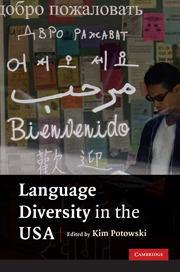Book contents
- Frontmatter
- Contents
- List of figures
- List of contributors
- Preface
- Acknowledgements
- 1 Language diversity in the USA
- 2 Language contact in the USA
- 3 Native American languages in the USA
- 4 Spanish in the USA
- 5 Chinese in the USA
- 6 Tagalog in the USA
- 7 French in the USA
- 8 Vietnamese in the USA
- 9 German in the USA
- 10 Korean in the USA
- 11 Russian in the USA
- 12 Italian in the USA
- 13 Arabic in the USA
- 14 Portuguese in the USA
- 15 Polish in the USA
- 16 Language policy in the USA
- Notes
- Media resources related to the top twelve non-English languages in the USA
- References
- Index
Preface
Published online by Cambridge University Press: 05 June 2012
- Frontmatter
- Contents
- List of figures
- List of contributors
- Preface
- Acknowledgements
- 1 Language diversity in the USA
- 2 Language contact in the USA
- 3 Native American languages in the USA
- 4 Spanish in the USA
- 5 Chinese in the USA
- 6 Tagalog in the USA
- 7 French in the USA
- 8 Vietnamese in the USA
- 9 German in the USA
- 10 Korean in the USA
- 11 Russian in the USA
- 12 Italian in the USA
- 13 Arabic in the USA
- 14 Portuguese in the USA
- 15 Polish in the USA
- 16 Language policy in the USA
- Notes
- Media resources related to the top twelve non-English languages in the USA
- References
- Index
Summary
Take a walk down the streets of any large city in the USA – and increasingly many mid-sized cities and small towns – and you can usually hear more than one language spoken by local residents. Some may think that this linguistic diversity is due entirely to recent immigration. However, as this book seeks to demonstrate, the USA has always been linguistically diverse. And while a large part of our diversity is thanks to immigration, some of it is due to other factors such as land purchases and annexations. In addition, a large portion of today's speakers of Languages Other Than English (often referred to as “LOTEs”) in the USA were born and raised in the USA. These are the children and grandchildren of immigrants – they themselves are not immigrants.
Yet it is undeniable that immigration is driving and sustaining our nation's proficiency in many LOTEs today. There are several excellent books about immigrants in the USA, most notably Portes and Rumbaut's (2006) fascinating account of immigrant experiences and the significant roles played by social class, residential patterns, and available networks. These authors note that language is a fundamental dimension of the process of acculturation, and that in the minds of many, the “litmus test of Americanization” is learning English and losing the mother tongue.
- Type
- Chapter
- Information
- Language Diversity in the USA , pp. xiii - xivPublisher: Cambridge University PressPrint publication year: 2010



